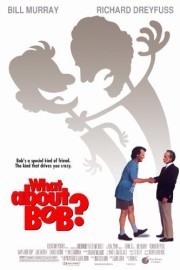What About Bob?
Frank Oz is best known for his classic work with Jim Henson doing puppetry and voicing some of the most iconic characters in history- Miss Piggy, Fozzy Bear, Animal, and Yoda- but he’s also a shrewd and wonderful comedic director. He started directing with Henson on “The Dark Crystal” and “The Muppets Take Manhattan,” but he soon made a name working with actors, and over the years, actors have done stellar work with him. My favorite film of his is the Hollywood comedy, “Bowfinger” (with Steve Martin and Eddie Murphy at their zany best), but not far behind is “What About Bob?,” his 1991 farce with Richard Dreyfuss and Bill Murray. It’s not really surprising to learn that Dreyfuss and Murray were not happy working with one another during the making of the film (Murray is notoriously difficult), but for this film, that tension only makes the film work more than it should.
The screenplay by Tom Schulman was based on a story by Alvin Sargent and Laura Ziskin, and it’s silly from the get go. We first meet Bob Wiley (Murray), a seriously troubled man who has intense psychological issues, not the least of which seems like agoraphobia and boundary issues that have led psychiatrist after psychiatrist to run for the hills. His latest victim is leaving the practice altogether, and has referred Bob to Dr. Leo Marvin (Dreyfuss), who has become acclaimed for his best-seller, Baby Steps. Dr. Marvin is getting ready to go on vacation with his family for a month when he has an introductory interview with Bob, who is an emotional wreck. Dr. Marvin does some typical therapeutic questioning of Bob in trying to discover the surface issues at work, and hands him a copy of his book. Dr. Marvin’s words are a revelation for Bob, and he finds himself taking “baby steps” to heart, and out into the world. Dr. Marvin thinks it will be an open and shut situation, but how he underestimates Bob. It’s not long before Bob follows Dr. Marvin and his family to the lake for vacation, and basically finds himself a part of the family, much to the annoyance of Dr. Marvin, who not only sees Bob’s tactics (including lying about killing himself) as invasive to the doctor-patient relationship, but also detrimental to having a relaxing vacation with his family, whom love Bob. That quick endearment upends Dr. Marvin’s emotional balance, and with an interview with Good Morning America on the horizon, Leo finds himself struggling to maintain his sanity in the face of Bob’s insertion of himself into his life.
It’s very easy to see this playing out as a psychological thriller (Hell, it has been, and not just by fans cutting the film to be so on YouTube), but Oz and his actors play it for laughs, and it works hilariously. The film takes liberties with reality to stretch the comedy in insane directions, because let’s be honest, Bob IS violating the core tenants of the doctor-patient relationship in dangerously unhealthy ways, but the film works because Murray and Dreyfuss commit to the situation fully. Oz sees this as a Warner Bros. cartoon of a premise, be it Bugs and Elmer Fudd or the Coyote and the Road Runner, and he delivers big laughs through particular setups, some broad (as when Bob finds himself helping Leo’s son Sigmund (Charlie Korsmo) with his diving, or when Leo goes to extreme tactics to rid him of Bob), and some subtle. The central premise of the comedy is that while Bob comes off as a rose, Leo gets more and more agitated, and is seen as increasingly unstable. It’s an easy joke, but Dreyfuss and Murray, as well as the supporting cast like Julie Hagerty as Leo’s wife Faye and Kathryn Erbe as daughter Anna, sell it effortlessly. The Looney Toons tone of the comedy makes it difficult to get our emotions too invested in the characters, but you don’t care too much when the actors sell what Oz is offering so beautifully.
When great comedic directors are mentioned, one thinks of Woody Allen, Billy Wilder, Mel Brooks, the Coen Brothers and John Hughes, iconoclasts who specialized in specific types of films and stories. I can easily think of Frank Oz being in that company. Although his most beloved work will always be in puppetry, his chops as a comedy filmmaker recall the screwball comedies of the ’30s and ’40s. “Bowfinger” and “What About Bob?” are my favorites of his, but so many of his other films deliver comedic wizardry and tones that go beyond broad farce. “Little Shop of Horrors,” “Dirty Rotten Scoundrels,” “In & Out” and the British original version of “Death at a Funeral” are just a few examples of his varied gifts. Not all of his films will work (who can remember his failed remake of “The Stepford Wives?”), but he has an intelligence as a storyteller to know how to make something work that goes beyond a simple genre description, like his 2001 thriller, “The Score.” Murray and Dreyfuss are the stars of “What About Bob?,” but it’s Oz’s voice as a comedic director that makes it a classic comedy pleasure.










